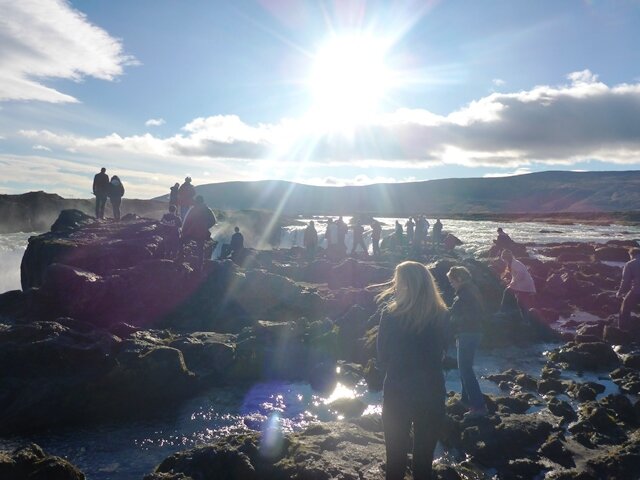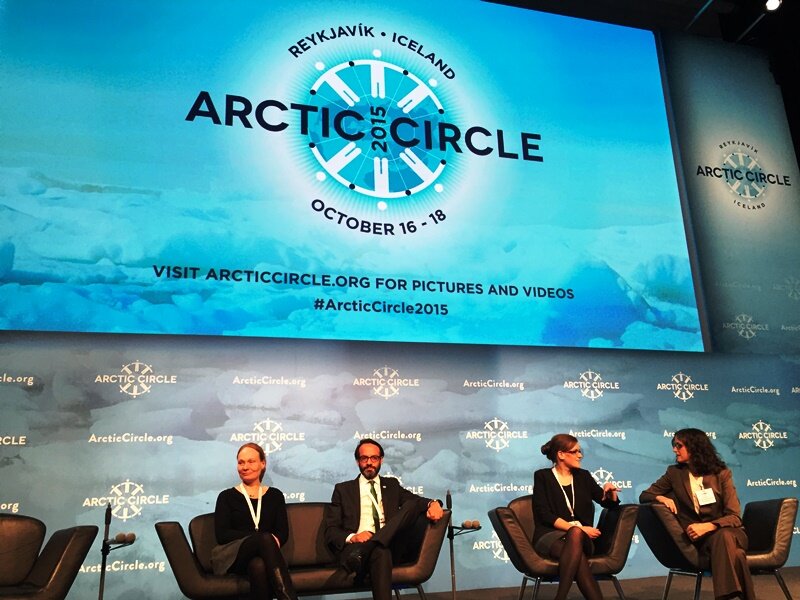Open Ph.D position at the Center for Permafrost at the University of Copenhagen
- Details
- Created on Wednesday, 12 December 2012 12:13

Subsurface carbon and nitrogen pools and potential mobilization in permafrost-affected soil environments
Center for Permafrost (CENPERM) at the University of Copenhagen is recruiting a Ph.D student to work in the field of soil science/biogeochemistry related to the turnover of carbon and nitrogen in permafrozen soil environments. The position is fully financed and part of the EU FP7 project: “Changing Permafrost in the Arctic and its Global Effects in the 21st Century – PAGE21” with an overall goal to quantify the vulnerability of permafrost environments to a changing global climate.
The Ph.D position is part of work package 3 (WP3) aiming to provide improved knowledge on belowground organic carbon (C) and nitrogen (N) pools and biogeochemical turnover in permafrozen soil and their partitioning in the landscape at field sites in Siberia, Svalbard and Greenland. The soil organic matter (SOM) lability and N-availability across landscape units and soil genetic horizons will be assessed using a suite of biogeochemical methods and techniques. Thaw induced C and N mobilization and conversion to CO2, CH4 and N2O will be quantified through a number of field investigations and laboratory experiments. Focus will be on the potential changes in soil specific greenhouse gas (GHG) production and consumption dynamics in response to thawing of currently permafrozen soil layers.
In addition to the biogeochemical focus on element transformations and potential GHG production, consumption and emissions, the Ph.D. position will work on methods for ensuring representative sampling of heterogeneous soil units and permafrozen landscapes as well as on the scaling issues involved in generalizing knowledge from individual sample units to landscape and region levels.
The successful candidate must hold a Master degree (M.Sc) or equivalent in physical geography or biology, preferably within the fields of soil science and biogeochemistry. Fluency in spoken and written English is a requirement.
An evaluation committee will be appointed to evaluate the applications. Applicants will be notified of the composition of the committee. The final selection of a successful candidate will be made based on the recommendations of the evaluation committee. The successful candidate will then be requested to formally apply for enrolment as a Ph.D student at the Ph.D school of Science, University of Copenhagen and be offered a working contract for the 3 year Ph.D study period.
Terms of appointment and payment are in accordance with the agreement between the Danish Ministry of Finance and the Danish Federation of Professional Associations (AC). The starting salary for candidates with an M.Sc degree will be a minimum of DKK 300.174 per year (April 2011 level) plus pension contribution DKK 41.013 and the possibility to negotiate wage. The main working place will be in CENPERM located at the Department of Geography and Geology, University of Copenhagen. Research will be carried out in cooperation with the University of Stockholm, department of Physical Geography and Quaternary Geology.
The University of Copenhagen wishes to reflect the diversity of society and welcomes applications from all qualified candidates regardless of personal background.
For further information, please contact CENPERM director and Professor Bo Elberling e-mail: This email address is being protected from spambots. You need JavaScript enabled to view it. ">This email address is being protected from spambots. You need JavaScript enabled to view it.
How to apply
The application must contain the following files when applying online via this address: http://www.ku.dk/english/available_positions/vip/
- Curriculum vitae
- Project description including technical approaches (max 3 pages)
- List of publications
- Transcript of University examinations
- Contact details for 2 persons for references
The deadline for applications is Monday 21 January 2013.
Applications received after the deadline, or with insufficient documentation or otherwise not complying with the above requirements, will not be considered. It is expected that the successful candidate will be enrolled at the Ph.D School of the Faculty of Science no later than 1 month after the start of the Ph.D scholarship preferably by February 1, 2013.
Copenhagen University is the oldest university in Denmark founded in 1479. The university is with its approximately 37000 students and 7500 staff, the largest university in the Nordic area and the only Nordic university on the world top 100 (www.ku.dk).
Samoylov Island expedition in German television
- Details
- Created on Tuesday, 11 December 2012 16:04
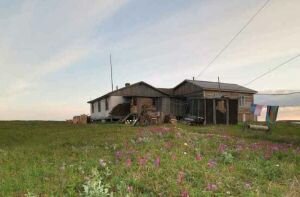 A crew from the Berlin and Brandenburg's regional public-broadcasting TV channel RBB visited the Samoylov Island research station at the Lena river delta in Russia this summer. They made a documentary about the Alfred Wegener Institute's Lena / Muostakh expedition.
A crew from the Berlin and Brandenburg's regional public-broadcasting TV channel RBB visited the Samoylov Island research station at the Lena river delta in Russia this summer. They made a documentary about the Alfred Wegener Institute's Lena / Muostakh expedition.
PAGE21 in ArcticNet's eighth Annual Scientific Meeting
- Details
- Created on Friday, 07 December 2012 13:50
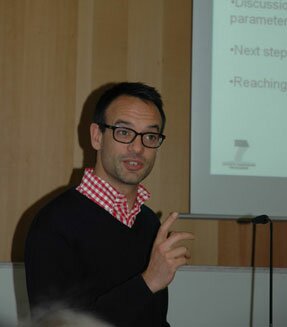 Hugues Lantuit and Stefanie Weege from Alfred Wegener Institute will present the PAGE21 project in Vancouver next week at the ArcticNet's eighth Annual Scientific Meeting.
Hugues Lantuit and Stefanie Weege from Alfred Wegener Institute will present the PAGE21 project in Vancouver next week at the ArcticNet's eighth Annual Scientific Meeting.
Report on permafrost released by the United Nations Environment Programme
- Details
- Created on Thursday, 06 December 2012 14:56
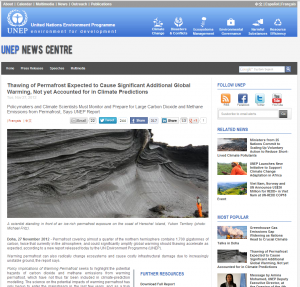 The United Nations Environment Program released last week a new report on permafrost and its impacts to climate change.
The United Nations Environment Program released last week a new report on permafrost and its impacts to climate change.
The United Nations Environment Program website reports that "Policy Implications of Warming Permafrost seeks to highlight the potential hazards of carbon dioxide and methane emissions from warming permafrost, which have not thus far been included in climate-prediction modeling. The science on the potential impacts of warming permafrost has only begun to enter the mainstream in the last few years, and as a truly "emerging issue" could not have been included in climate change modeling to date".
Postdoc position to work on surface temperature downscaling within PAGE21 in Workpackage 5
- Details
- Created on Tuesday, 04 December 2012 09:56
Post-doctoral position in Surface Temperature Downscaling in Arctic regions
(18 months, starting 1st May 2013)
A postdoctoral position is proposed by the Laboratoire des Sciences du Climat et de l'Environnement (LSCE, Gif-sur-Yvette, France), and the Laboratoire de Glaciologie et de Géophysique de l’Environnement (LGGE, Grenoble, France), in close collaboration with the CARTEL laboratory (Pr. A. Royer, Université de Sherbrooke, Québec, Canada).
Background: The European project FP7-PAGE21 aims to better understand and quantify the vulnerability of permafrost environments to a changing global climate and to investigate the feedback mechanisms associated with increasing greenhouse gas emissions from permafrost zones. Within this project, remote sensing data products will be developed for model validation and upscaling of site measurements. For this purpose, we have proposed to combine thermal infrared and microwave surface measurements to estimate the surface temperature at regional scale over the main project sites.
Job description: The post-doctoral research scientist will be integrated in the remote sensing team at the LSCE (http://www.lsce.ipsl.fr/), in close interaction with the CARTEL and LGGE laboratories. He/she will work on the downscaling of surface temperature time series developed at CARTEL at 20 km scale on the meso scale sites of the project. The objective is to estimate the surface temperature of the different types of vegetation present inside the 20 km pixel, using prior information given by a land surface model and higher resolution thermal data acquired in cloudless conditions at 1km scale. The methodology is based on the assimilation of the remote sensing data in the land surface model ORCHIDEE (http://orchidee.ipsl.jussieu.fr/). The ORCHIDEE model simulates, from local to global scale, the functioning of the vegetation, including mass (water, carbon) and energy transfers in the soil-plant-atmosphere continuum. It is able to simulate a first guess of the surface temperature for each type of vegetation present in the microwave low resolution pixel. It will be used to constrain the assimilation process based on particle filtering. This method has been successfully developed at LSCE on the SETHYS land surface model and has to be transferred to the ORCHIDEE model. The different tasks to be conducted are the following:
- Analysis of the microwave surface temperature series processed by CARTEL, on the Arctic region on the 2000-2010 snow-free period, and comparison with MODIS thermal infrared surface temperature products (about 4 months)
- Implementation of ORCHIDEE on the PAGE21 sites (100km squares around the experimental station), using the land cover maps developed at LSCE (2months)
- Comparison of the surface temperature simulated to the observed ones on homogeneous pixels and development of the observation operators (2 months)
- Development of the assimilation procedure on the ORCHIDEE model (4 months)
- Processing of the downscaling temperatures on the sites (2 months)
- Publication of the work (2 months)
Qualifications: The candidate must have a Ph.D. in the field of Environment, with a background in numerical modelling and/or data processing. In addition the candidate must master the tools such as Fortran (ORCHIDEE is written in Fortran) and Unix. The successful candidate will be expected to attend international conferences and to publish his results in international peer-reviewed journals.
Applications: Candidates should submit, by email, a cover letter with a statement of research interests, a CV, as well as the names and addresses of two referees before 30 December 2012 to Catherine Ottlé, LSCE-Orme, CEA-Orme des Merisiers, F-91191 Gif-sur-Yvette, Cedex, France (This email address is being protected from spambots. You need JavaScript enabled to view it. ), Michel Fily, LGGE, BP 96, F-38402 Saint-Martin d’Hères cedex, France (This email address is being protected from spambots. You need JavaScript enabled to view it. ) and Alain Royer, 2500 Bd Université, Sherbrooke, Qc J1K 2R1 Canada (This email address is being protected from spambots. You need JavaScript enabled to view it.
Review of applicants will begin soon after the deadline and will be continued until the position is filled. Salary will depend on the previous experience and C.V. of the successful candidate, in agreement with legal and employer regulations.



